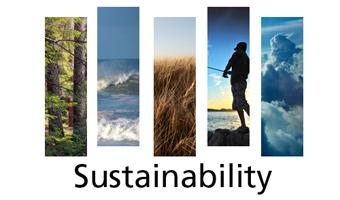The Sustainability Studies theme is featuring a Spring 2016 course that combines art and science in search of creative solutions to the real-world problems of sustainability.
Leading scientists from around the world will pose these problems to students in person or on Skype.
ART 4900 Art + Science (Studio Art Topics) is offered Tuesday and Thursday from 1:30 to 4:20 p.m. in Spring 2016.
 This is a studio art course where students from disparate disciplines collaborate to create artistic propositions as solutions to real problems in the sciences of sustainability. Students’ artistic propositions will be exhibited at the Kennedy Museum of Art in late spring, and students will develop and execute workshops for the public at the museum in conjunction with the exhibit. This is a time-intensive course that requires a flexible schedule and immersive group work that may extend to evenings and weekends. For more information, contact John Sabraw, Professor of Painting, at sabraw@ohio.edu.
This is a studio art course where students from disparate disciplines collaborate to create artistic propositions as solutions to real problems in the sciences of sustainability. Students’ artistic propositions will be exhibited at the Kennedy Museum of Art in late spring, and students will develop and execute workshops for the public at the museum in conjunction with the exhibit. This is a time-intensive course that requires a flexible schedule and immersive group work that may extend to evenings and weekends. For more information, contact John Sabraw, Professor of Painting, at sabraw@ohio.edu.
Sabraw has been widely written about in art, science and popular media for his impressive body of work utilizing painting pigments created with toxic mine runoff.
See more about Sustainability Studies courses—many of which fill Ohio University General Education requirements and/or College of Arts & Sciences Distribution.
Spring 2016 Sustainability Courses
Quick Guide
- ART 4900 Art + Science (Studio Art Topics) T/Th 1:30 to 4:20 (Sabraw)
- BIOS 2200 – Conservation and Biodiversity (T2-AS), T/Th 1:30-2:50 (Gurien)
- CAS 1300X – Sustainable Solutions, online (Manring)
- CAS 1415 – Introduction to Sustainability (A&S-SS/NS), MWF -11:50-12:45 (Manring)
- ENG 3100J – Writing about Environmental Sustainability (T1-JC), Multiple Sections
- GEOG 4520 – Environmental and Sustainability Planning, MWF 10:45-11:40 (Lynch)
- GEOL 2310 – Water and Pollution (T2-AS), online (Lopez)
- PBIO 2060 – Sustainable Agriculture (T2-AS), M 9:40-11:40 + lab (Trese)
- T4850 – Sustainability Citizenship (T3), T/Th 10:30-11:50 (Manring)
Tier III
- T3 4850: Sustainability Citizenship (Tier III)
Social Sciences
- AAS 2540 – History of Injustice in the United States
- ANTH 1010 – Introduction to Cultural Anthropology
- ANTH 2020 – Introduction to World Archaeology
- ECON 3140 – Natural Resources Economics
- ECON 3350 – Economics of Energy
- GEOG 1310 – Globalization and the Developing World (2CP)
- GEOG 2400 – Environment Geography
- GEOG 3210 – Population Geography
- GEOG 3310 – Geography of Africa
- GEOG 3330 – Appalachia: Land and People
- GEOG 3410 – Geography of Hunger and Food Geography
- GEOG 3430 – Global Issues in Environment
- GEOG 3440 – Agricultural Ecosystems
- GEOG 4520 – Environmental and Sustainability Planning
- GEOG 4560 – The City and the Environment
- SOC 3090 – Sociology of Appalachia
- SOC 4140 – Contemporary Social Movements
Natural Sciences
- BIOS 1000 – Animal Diversity (Mammone)
- BIOS 2200 – Conservation and Biodiversity
- BIOS 4290 – Marine Biology
- CHEM 1210 – Principles of Chemistry I
- GEOG 3160 – Biogeography
- GEOG 3580 – Environmental Hazards
- GEOL 2150 – Environmental Geology
- GEOL 2310 – Water and Pollution
- GEOL 3300 – Principles of Geomorphology
- PBIO 1000 – Plants and the Global Environment
- PBIO 1030 – Plants and People
- PBIO 1090 – Americans and Their Forests
- PBIO 2060 – Sustainable Agriculture
- PBIO 2090 – Plant Ecology
Humanities
- ENG 3100J – Writing About Environmental Sustainability
- ENG 3850 – Writing about Culture and Society
- ENG 4600 – Topics in English Studies
- PHIL 2400 – Social and Political Philosophy
- PHIL 4400 – Contemporary Social Philosophy
- WGSS 4100 – Global Feminism
Environmental Studies
- ES 4500 – Environmental Studies Capstone Seminar


















Comments